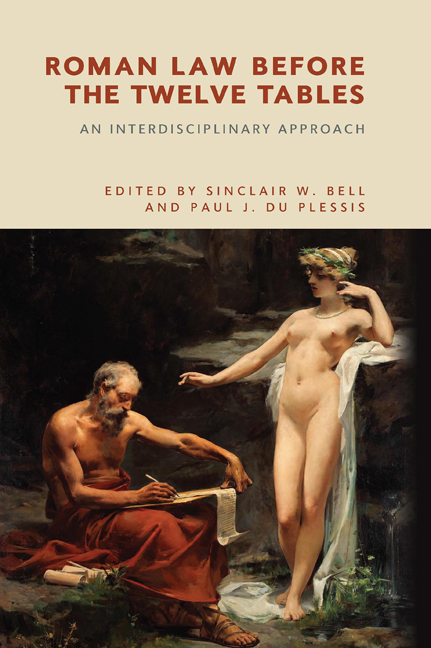Book contents
- Frontmatter
- Contents
- The Contributors
- Introduction: The Dawn of Roman Law
- Part I The Materiality of Roman Law: New Archaeological Discoveries
- 1 Roman Law in its Italic Context
- 2 Central Italian Elite Groups as Aristocratic Houses in the Ninth to Sixth Centuries BCE
- 3 Authority and Display in Sixth-Century Etruria: The Vicchio Stele
- Part II Constructing Early Roman Law: Sources and Methods
- 4 The Twelve Tables and the leges regiae: A Problem of Validity
- 5 The leges regiae in Livy: Narratological and Stylistic Strategies
- 6 The leges regiae through Tradition, Historicity and Invention: A Comparison of Historico-literary and Jurisprudential Sources
- 7 The Laws of the Kings – A View from a Distance
- 8 Beyond the Pomerium: Expansion and Legislative Authority in Archaic Rome
- Part III Roman Law in Historiography and Theory
- 9 Niebuhr and Bachofen: New Forms of Evidence on Roman History
- 10 Finding Melanesia in Ancient Rome: Mauss’ Anthropology of nexum
- Index
Introduction: The Dawn of Roman Law
Published online by Cambridge University Press: 22 September 2020
- Frontmatter
- Contents
- The Contributors
- Introduction: The Dawn of Roman Law
- Part I The Materiality of Roman Law: New Archaeological Discoveries
- 1 Roman Law in its Italic Context
- 2 Central Italian Elite Groups as Aristocratic Houses in the Ninth to Sixth Centuries BCE
- 3 Authority and Display in Sixth-Century Etruria: The Vicchio Stele
- Part II Constructing Early Roman Law: Sources and Methods
- 4 The Twelve Tables and the leges regiae: A Problem of Validity
- 5 The leges regiae in Livy: Narratological and Stylistic Strategies
- 6 The leges regiae through Tradition, Historicity and Invention: A Comparison of Historico-literary and Jurisprudential Sources
- 7 The Laws of the Kings – A View from a Distance
- 8 Beyond the Pomerium: Expansion and Legislative Authority in Archaic Rome
- Part III Roman Law in Historiography and Theory
- 9 Niebuhr and Bachofen: New Forms of Evidence on Roman History
- 10 Finding Melanesia in Ancient Rome: Mauss’ Anthropology of nexum
- Index
Summary
INTRODUCTION
When the compilers of Justinian's Digest in the sixth century CE reflected on the origins of Roman law as a legal order, they decided that the topic was of such importance that it had to be placed at the very front of the Digest, in book 1 title 2, directly after the introductory title in which central concepts such as ‘justice’ and ‘law’ were explained. In compiling this title, they relied on the works of two Roman jurists. The first, the enigmatic Gaius, a jurist of the mid-second century CE who, in a book (now lost) on the Twelve Tables (lex Duodecim Tabularum), wrote: ‘Since I am aiming to give an interpretation of the ancient laws, I have concluded that I must trace the law of the Roman people from the very beginning of their city. This is not because I like making excessively wordy commentaries, but because I can see that in every subject a perfect job is one whose parts hang together properly.’ While there is no doubt some Greek philosophy latent in this statement, it is not the main focus of our discussion here. For us, as for Gaius, it is important to stress that origins matter. No subject can be understood properly without a fundamental appreciation of its history. This fundamental principle is one the Romans understood only too well and, in this time of ‘presentism’, has become more important than ever.
But the compilers did not rely solely on Gaius’ book on the Twelve Tables. We do not know why. Instead, they chose to populate the rest of the title with a long passage from Pomponius’ Enchiridion (Manual). Much has been written about this account of the history of Roman law, written by a Roman jurist who lived during the reign of Marcus Aurelius. As the only comprehensive narrative concerning the development of Roman law, it has become a cornerstone for subsequent understanding of the nature and contours of the Roman legal order. And although not unproblematic, given the absence of corroborating evidence, it has left an enduring imprint – it is, for example, central to Edward Gibbon's account of Roman law in his seminal Decline and Fall.
- Type
- Chapter
- Information
- Roman Law before the Twelve TablesAn Interdisciplinary Approach, pp. 1 - 6Publisher: Edinburgh University PressPrint publication year: 2020



